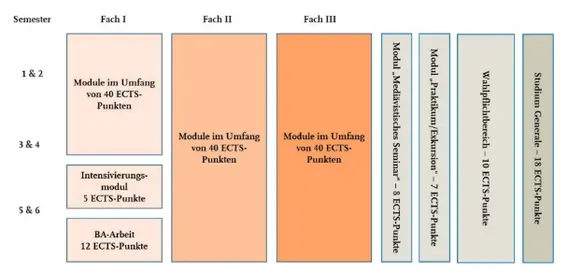Structure and Curriculum
The bachelor’s degree programme in Medieval Studies offers a wide variety of courses and many different electives from numerous participating disciplines to ensure your studies are tailored to you.
A self-selected focus area from each of the three thematic clusters will form the core of your studies. Additionally, you will attend seminars created specifically for this programme, which enable discussions with your fellow students and provide research-based insights into various disciplines. You will also take part in field trips to gain first-hand practical experience, and you can receive credit for several weeks of internship. You can also acquire further skills through your selections in the required elective component.
You can find a more detailed overview in the module handbook.
As part of your studies, you will select one discipline out of each of the three thematic clusters. This means that a diverse range of combinations are possible (for example, Latin Studies, Medieval History and Medieval Art History). The aim is to open up the cultural, social, economic, political, philosophical and theological structures of the European Middle Ages to you in different ways.
Thematic cluster I: Linguistic structures and literary representation:
English Studies; German Language, Literature and Culture; Iranian Studies; Greek and Latin Studies; Romance Studies (Spanish/French/Italian); Slavic Studies (Russian/Polish/Czech/Croatian/Bosnian/Serbian)
Thematic cluster II: Historical sources and theoretical texts:
Medieval History, Auxiliary Sciences of History, Philosophy, Catholic Theology
Thematic cluster III: Material culture and visual representation:
Medieval and Post-Medieval Archaeology, Heritage Conservation Studies, Islamic Art and Archaeology, Art History
Read more on each of the participating disciplines.
A multidisciplinary series of medieval studies seminars is also aimed specifically at students within the Centre of Medieval Studies (ZEMAS). These seminars are designed to explore a topic using the knowledge and methods of different subjects in a practical and research-oriented way and to promote interdisciplinary expertise and networking. Each seminar is held by teaching staff from a different sub-discipline of medieval studies; the programme, as a whole, intends to give students an impression of the diverse disciplinary aspects one topic can have. Furthermore, shorter block courses have also frequently been offered. These can be credited as the medieval studies seminar component, such as insights into various medieval languages.
Four to eight seminars can be taken as part of this module.
The following language skills are required to successfully complete the Interdisciplinary Medieval Studies programme. Language skills can be acquired at the beginning of the degree programme or during the semesters leading up to the final thesis, i.e. towards the end of the Bachelor's degree programme.
- English language skills that allow the fluent reception of even elaborate academic texts, both written and spoken
- Knowledge of a further modern language
- Latin knowledge that allows you to work independently with medieval Latin sources
Language skills are usually substantiated by:
- a minimum of five years of English lessons at school
- a minimum of three years of lessons at school in the relevant modern foreign language
- a qualifying examination in Latin (Latinum/proficient level).
It is possible for equivalent language skills acquired in other ways (e.g. Ancient Greek) to be recognised. Please contact the programme coordinator for this purpose.
If you would like to improve your language skills at the University of Bamberg, you will find an extensive selection of language courses offered on the Language Centre’s webpages.
In field trips, you’ll discover current research first hand under practical conditions, for example in archives, museums, heritage sites, whole cities or research institutes. Visits to cathedrals, for example, enhance theoretical lessons held in seminar rooms. These chances to view original historical artefacts and sites are so important to us that you can expect to spend between four and six full days on field trips.
In internships, you can gain professional experience, for example in libraries, museums, foundations, research institutes, companies, historical parks or other historical institutions. You can receive credit for four to twelve weeks of internships.
The required elective component is intended to be used to gain or consolidate transferable, professional, didactic and foreign language skills. As part of this component, you can
- receive credits for additional internship periods
- gain or develop language skills
- gain initial or further knowledge in the field of cultural informatics or applied computer science
- research religious traditions (Catholic Theology, Islamic Studies/Oriental Studies, Jewish Studies
You will write your bachelor’s thesis in one of your chosen disciplines. The choice of topic and your approach can incorporate the interdisciplinary focus of the degree programme. The bachelor’s thesis is an independent piece of written work that shows you have fundamental and sufficiently specialised knowledge of the subject you have studied within at least one discipline participating in the Interdisciplinary Medieval Studies programme. It also establishes that you are able to work independently on an illustrative topic using academic methodologies within a fixed period of time. You will also complete an additional immersion module in the same discipline that you write your bachelor’s thesis in, helping you specialise in this area.
